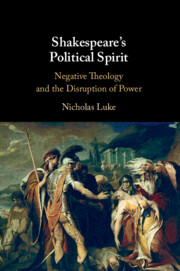Book contents
- Shakespeare’s Political Spirit
- Shakespeare’s Political Spirit
- Copyright page
- Contents
- Acknowledgements
- Introduction
- Chapter 1 Jack Cade in a Time of Protest
- Chapter 2 The Spirit of Caesar and the Second Circle
- Chapter 3 Coriolanus and the Work of Spirit
- Chapter 4 Not to Be – To Be
- Chapter 5 The Tempest and the Spirit of the Air
- Afterword
- Notes
- Works Cited
- Index
Introduction
Published online by Cambridge University Press: 12 December 2024
- Shakespeare’s Political Spirit
- Shakespeare’s Political Spirit
- Copyright page
- Contents
- Acknowledgements
- Introduction
- Chapter 1 Jack Cade in a Time of Protest
- Chapter 2 The Spirit of Caesar and the Second Circle
- Chapter 3 Coriolanus and the Work of Spirit
- Chapter 4 Not to Be – To Be
- Chapter 5 The Tempest and the Spirit of the Air
- Afterword
- Notes
- Works Cited
- Index
Summary
The book looks to the creative potential of experiences of failure, haunting, estrangement, impasse, or dream in Shakespeare. The focus is not just on what the plays represent but on what they do and how they inspire and unsettle the political imaginations of their audiences. The Introduction sets out the intellectual heritage underpinning this approach, including the tradition of negative theology and subsequent philosophies of the negative (Hegel, Kierkegaard, Benjamin, Adorno, Derrida, Badiou). It thereby establishes a negative political theology that challenges the official (or positive) political theology that sacralises power. By outlining “the disruptive spirit of negativity”, it shifts critical focus from the mimetic to the affective and opens new and more nuanced readings. The approach builds on the work of critics such as Annabel Patterson, Andrew Hadfield, and Chris Fitter, who have highlighted the anti-monarchical or popular political forces at play during the period. In the via negativia, however, it explores a very different origin and mode of egalitarianism. It focuses on the way negativity and unsettlement imaginatively transform political thought and relations. Shakespeare’s drama opens up visions of something other, including radical experiences of the “perhaps” or “what if”, that deepen the audience’s political thought.
Keywords
- Type
- Chapter
- Information
- Shakespeare's Political SpiritNegative Theology and the Disruption of Power, pp. 1 - 37Publisher: Cambridge University PressPrint publication year: 2024

